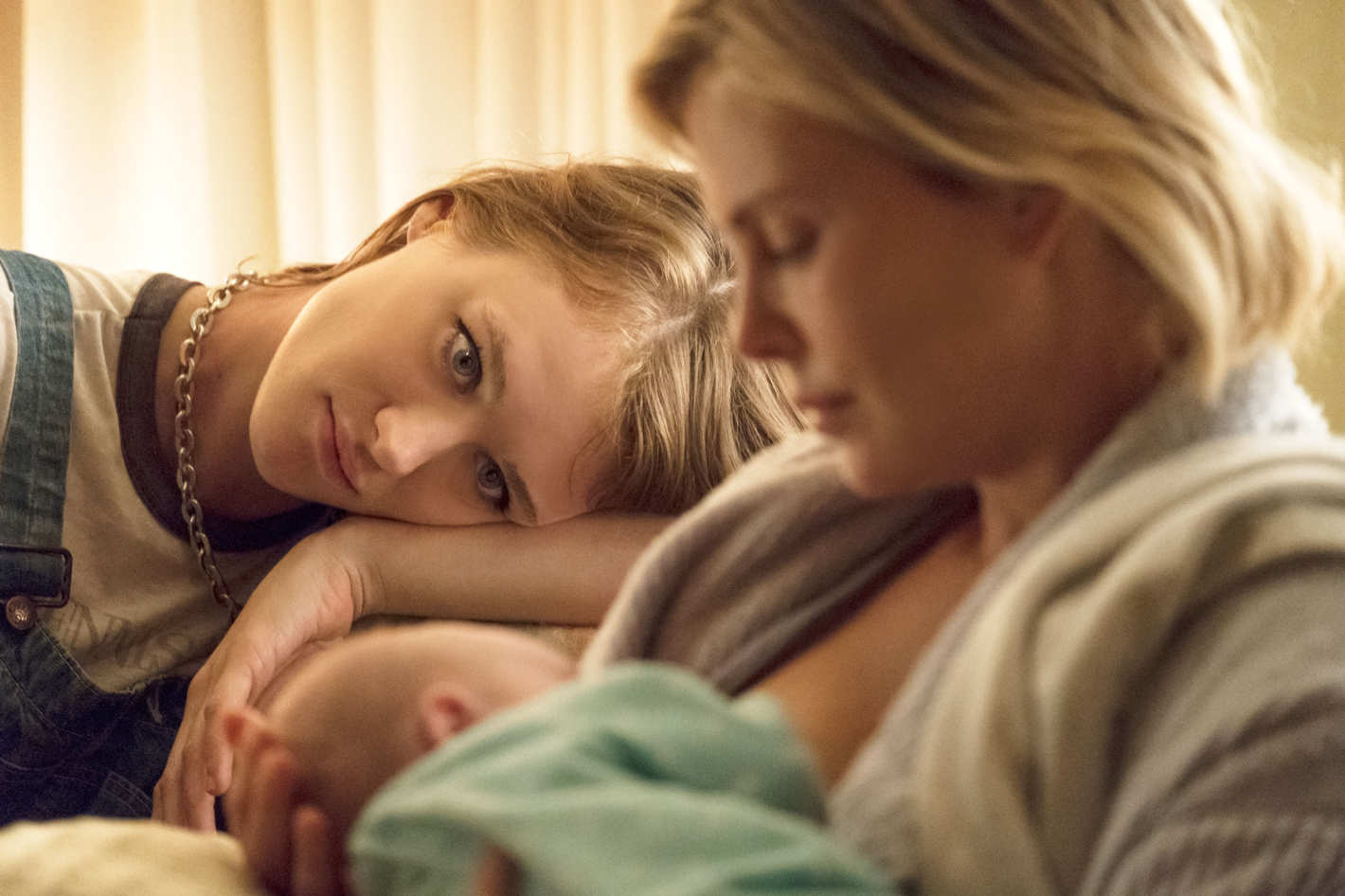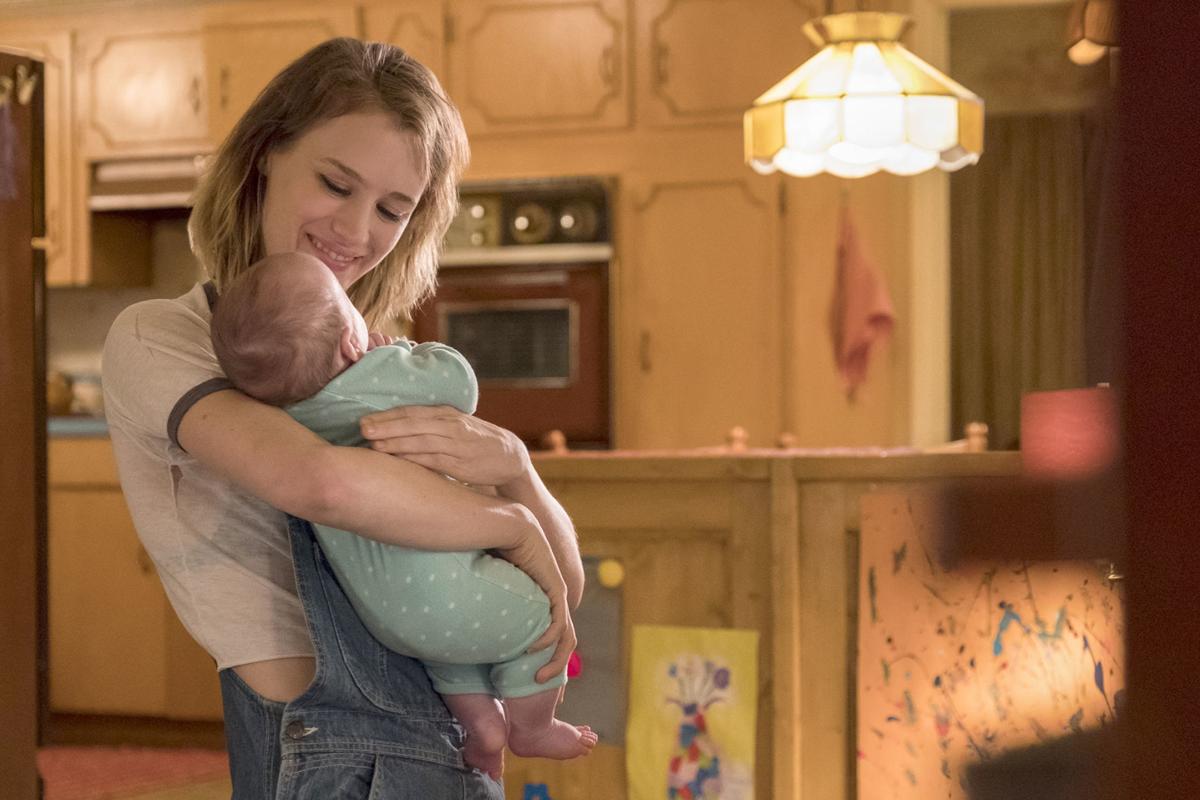
The following review was written by Caleb Ackley. Tully is now available on iTunes, Amazon, and other outlets as of today, July 17. Spoilers below.

Charlize Theron isn’t a name typically associated with the average in society. Known best for her roles which require both acting ability and incredible athleticism — think suave assassin in Atomic Blonde or shaven-headed warrior in Mad Max: Fury Road — the name of Theron rarely evokes the pedestrian struggles of a stay-at-home mom. But the year is 2018, after all, and anything, it seems, is possible.
Enter Tully, the latest offering from director Jason Reitman, which stars the aforementioned Theron alongside Mackenzie Davis. I wasn’t sure what to expect from such an amalgamation of star power and normal life but was willing to go along for the ride. And so it was that with sour patch kids in hand and the stinging regret that comes from not sneaking a can of Cabernet Sauvignon into the local theatre, I settled in for a late Thursday evening showing.
The story, which was solely written by Diablo Cody of Juno fame, centers around Theron as a conflicted mother of three. Marlo, the character played by Theron, has in some ways achieved a kind of ideal. While she has the husband, the house and the kids that society has insisted on, Marlo is dissatisfied as she navigates the complexity of both her son’s possible autism (acted beautifully by Asher Miles Fallica), and her third pregnancy. While on paper the ideal has been achieved, Marlo’s life is far from what she had anticipated or expected. Taking note of her insistent malaise and visible lack of sleep, Marlo’s wealthy older brother offers to pay for a night nanny once the new baby is born. Initially resistant to the privilege associated with such an expenditure, Marlo eventually decides to reach out, with the camera cutting away before the actual call is made.
That evening, the titular character of Tully, played with disarming joy and nuanced complexity by Mackenzie Davis, arrives at Marlo’s house. Their initial introduction is understandably awkward, but the two women begin to form a bond. And though Tully has an aptitude for emotional support that Marlo needs, it soon becomes clear that Marlo is not the only one in need of help. Tully’s life, too, is in an unhappy and dissatisfied place. Marlo longs for the freedom she associates with her 20s, while Tully craves the stability that Marlo has achieved.
One evening, Tully insists that Marlo reclaim her youth by going out on the town. They drink, they see a music show, they get noticed by men. Marlo fantasizes about an ex-lover and they ride the streets drunk on bicycles. Their revelry is stopped short when Marlo gets overwhelmed with guilt at having left her child. As Marlo drives both her and Tully home, Tully reveals that she must leave them and move on to other work. The conversation eventually shifts, and the two women begin recounting the overlooked details in Marlo’s life that give them joy. While doing so, both fall asleep, and Marlo wakes up to the sound of a blaring horn. Swerving, she careens off the side of the highway and sends the car down an embankment into the river below.
Marlo, unable to detach her seatbelt and now mysteriously alone in the car as it sinks deeper below the water, sees a shape approaching of which she had dreamt previously. Tully, with the body of a mermaid, unlatches the seatbelt and then disappears as Marlo swims to the surface. Waking up under the harsh glare of hospital lights, Marlo is greeted by her husband, who is summoned outside by the doctor. Asked about any history of mental illness, he denies that there have been long-term issues but does mention a postpartum depression that occurred after the birth of their son. The doctor reveals that Marlo is in fact showing signs of extreme exhaustion. Confused, Marlo’s husband is asked to fill out paperwork and gives Marlo’s maiden name to the nurse. “Tully,” he says. Though Marlo had often spoken of Tully, he confesses that he had never actually met her and, in that admission, realizes that there had never been a night nurse present in the first place.
The film comes to a close with Marlo and her husband talking honestly, reaffirming their commitment to each other. Marlo, now bruised and visibly broken, is shown going about her daily tasks as before, now with the aid of crutches, and the credits roll.
For some, this film, in its substance and its ending, could be considered hopeless. The young woman with a passion for life moves to the suburbs with a husband and three complicated children, sacrificing her individuality in favor of societal expectation. While a valid criticism in some ways, the beauty of this film is found when one is able to peel back the metanarrative, exposing the complex wonder of the film’s subject.
Tully is rife with the perils of comparison and expectation. Marlo, as her older self, mourns the loss of her vitality and energetic dreams while in the same breath sees the younger version of herself pine for the stability of her suburban life. While it would be easy to simply categorize these different characters as either good or bad, to do so would be to miss a treasure trove of hope-inducing nuance. While both versions of Marlo exist, neither is fully good nor fully bad (*cue training as English major*). It is precisely because of that complexity that this film is not only well-done, but absolutely vital for our culture at this moment.
Our society is controlled by the very things that Marlo has such a difficult time with: expectation and comparison. We are bombarded day in and day out by promises and pictures of a better life, a more fulfilling existence, and a more story-worthy future. Whether it is through a friend’s doctored images on Instagram or advertisements telling us to ‘Live a Great Story,’ the pressure to be spectacular in every aspect of our lives has never been greater.

And it is for that very reason that Tully left me with a great deal of subdued joy. Here is a film that takes an unfiltered look at the hardship we endure when expectation, rather than contentment, marks us as people. That is not to say there isn’t a time and place for brilliant dreams, but if we require that of ourselves and of others every waking moment we will, like Marlo, begin to suffocate. This film, in its final montage of Marlo on crutches, resonated with me in the same way that Keats’ ‘To Autumn’ or Whitman’s ‘Crossing Brooklyn Ferry’ did. Both of these poems, in their tone and in their scope, much like Tully, highlighted the beauty that is found in the common. Early on in Keats’ seminal work ‘To Autumn,’ he shows Autumn in various attitudes, ranging from sleep to watchfulness.
Sometimes whoever seeks abroad may find
Thee sitting careless on a granary floor,
Thy hair soft-lifted by the winnowing wind;
Or on a half-reap’d furrow sound asleep…
Or by a cyder-press, with patient look,
Thou watchest the last oozings hours by hours. (ll. 13-16, 21-22)
The hustle and bustle of both summer and the harvest having passed, there is now time for rest and reflection. While summer is typically marked by a flurry of activity, autumn, in this passage, is marked by patience and watchfulness. There is no loudness here, simply waiting in contentment. This speaks volumes as to how Keats himself chose to spend his final years and months, and is also the state in which we leave Marlo at the end of the film; savoring the changing air and the orange glow cast by the lowered sun, accepting it rather than denying it, breathing it in deeply rather than attempting to hold her breath.

Whitman, in ‘Crossing Brooklyn Ferry,’ places value on the everyday passerby as he embarks on a journey from Manhattan to Brooklyn. Toward the end of the poem he begins to use the terms ‘great’ and ‘small,’ pairing them together as he underlines the importance of both.
…or the negligent leaning of their flesh against me as I sat,
Saw many I loved in the street or ferry-boat or public assembly,
Yet never told them a word,
Living the same life with the rest, the same old laughing, gnawing, sleeping,
Played the part that still looks back on the actor or actress,
The same old role, the role that is what we make it, as great as we like,
Or as small as we like, or both great and small. (ll. 123-132)
By juxtaposing these terms, Whitman actively makes the smallest gesture one of magnificent importance. Having spent most of the film looking back with regret, Marlo comes to realize by the last scene that what she had previously considered an insignificant and ‘small’ life is in actuality just as important as any of her youthful and ‘great’ fantasies. There is joy to be found in the grandiose and opulent, to be sure, but when this joy is not planted firmly in a healthy acceptance of and subsequent contentment in one’s life circumstance, it quickly becomes a millstone around one’s neck.
By the end of the film, the only visible changes to Marlo’s situation are the wounds she has endured. She doesn’t return to the job market, she doesn’t get a divorce, she just continues, not sporting a new career but rather limping on a set of crutches. Her wounds were always there, as ours so often are; the only thing that changes is that she is now living in tandem with them, rather than denying their existence. And so, while our situations may not always change the way we want them to, we may, like Marlo, live fully in view of our wounds. We are flawed individuals in need of crutches and the help of others.
It was in that frame of mind that I left the theatre with what I like to call a subdued joy. It is the joy found in the mediocre and the plain, the contentment that comes when we accept that the bathroom must be cleaned once a week, the dishes might need to wait until tomorrow, and the trash must be taken out. It is a joy borne of accepting the great alongside the small, rather than demanding the former over the latter. And it is with that duality in mind that we, like Marlo, can continue to move through our days, seeing the value of the dreams we once had as well as the beauty of the lives we currently live but so often overlook.

COMMENTS
Leave a Reply












